Growing peppadews
Growing peppadews from seed is a breeze. Never pay a lot of money for the rights to grow the new variety; they are so easy to plant that you will never get your capital back.
First bred in the nineties, this is a pepper that really should have taken the market by storm, but for some reason it has not. It has all the piquant flavour of the chili family without the extreme heat.
In that sense it is not unlike the Aleppo pepper that is almost impossible to get now; it is in the centre of the region where the superpowers are fighting a disgraceful war by proxy to keep their arms industries alive. Pity the Syrian people.
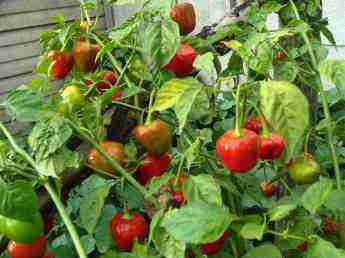
What exactly does piquant mean? They have a pleasantly sharp and appetising-flavour; spicy, peppery and hot. That is about right.
But they are not too hot, especially if you remove some or all of the seeds.
Perhaps more important, all the members of the pepper family in general have strongly anti-inflammatory properties in the body, but many of them are so hot that you cannot get enough of the active ingredient, known as capsaicin; that is just another reason for this DC to advocate enjoying these beauties, fresh from the garden. Do you have angry joints and muscles?
This page was last updated by Dr Bernard Preston on 9th April, 2021.
Peppadews are a spicy exception in the chili-family; they are hot without blowing your head off. You could bite into one provided you give the seeds the miss.
Peppadew recipes are so diverse; you could eat them straight from the jar, or enjoy them stuffed with feta-cheese or hummus for example. We love them daily through the summer and mild winters in our Eggs Florentine for breakfast; they give the spinach a bit of zip.
We now call it Eggs Hilton; satiety means feeling satisfied after a meal and not being famished a couple-hours later as happens with a cereal breakfast. Actually the effect stays with you for the whole day.
Then you can toss them into stews, slice them raw on bread and butter and add them to a salad; versatile is the word.
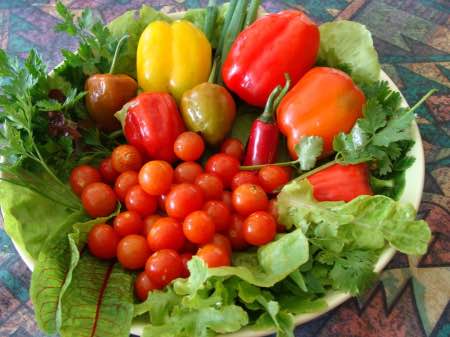
These are mixed salads from Bernard Preston's garden. There are three peppadews; smaller and to the left. Add olive oil and lemon juice and a scoop of homemade hummus and you have the makings of a very nutritious meal. There are least seven different coloured vegetables in this photograph; sparkling wellness from one scrumptious lunch.
Enjoy it with real bread; that is made from 100 percent wholemeal flour. The only way to get it is to grind the wheat and bake it yourself; it takes me only five minutes every day.
Growing peppadews
Growing peppadews is done in a warm spot or hothouse in the spring once the danger of frost is over; they have a long growing season. They are a rich source of the anti-inflammatory compound called capsaicin, and delicious in any salad.
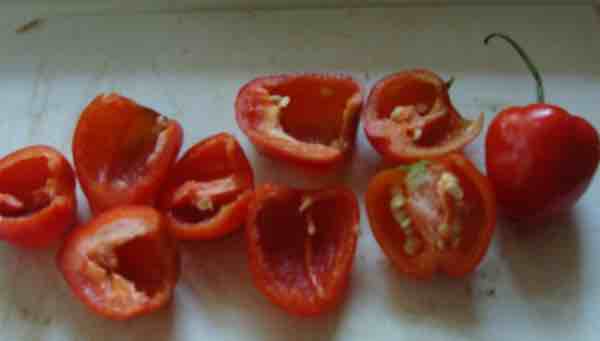
The only difficult part about growing peppadews is to find one raw fruit; carve out the seeds and spread them on absorbent paper to dry, and store them until spring.
Then you can plant them in seed boxes and keep in a warm spot. They germinate very easily like most peppers provided the earth is not still cold; best of course is in vermi-compost from the worm farm.
The plants grow to about two or three feet high; the branches will be so heavy in fruit that they should be supported, or they will collapse and will not turn red.
On a fence to which you can stake them or, better still, between horizontal bars about two feet high over which the branches can droop. Do keep them from lying on the ground under the weight of the fruit.
You do need to be patient; it is a long growing season but once they start to bear you can look forward to several months of fruit. I enjoy at least two or three virtually every day; in fact they continue to bear right through our mild winters. They will do wonders for an otherwise rather dull lettuce salad, for example.
Six plants have kept us in fruit for months; they just keep bearing, but then we do grow them in well composted soil; they are heavy feeders. And with beehives in the garden every single flower is pollinated.
They die back near the end of a mild winter, and will shoot again in the spring, but they are never as prolific after two years. I advise you to keep a few of last season's bushes as they will bear sooner, but plant more seed too.
It is now early summer and those plants from last year are looking just fine and dandy, but there are no flowers yet; the new seedlings are still quite small.
They will cross with any chilies or jalapenos in your garden, which means they can be very spicy; it is a bit of a Russian roulette. Some like it hot.
Cutting out the seeds and placenta will certainly reduce the heat, but that is where much of the capsaicin is found.
So, growing peppadews is not difficult. Water them well during any dry periods, like any other plants in the veggie garden.
The pepper family in general is the second richest source of vitamin C, after citrus; this week is the winter solstice and we are still enjoying them every day. Growing peppadews brings months of joy to your cooking; and better protection against colds and flu and, because of their zeaxanthin, from macular degeneration and cataracts.
Last week I chopped up about 20 fruit and froze them; they will last right through early summer until the new plants start to bear in December in the southern hemisphere.
Growing peppadews is a breeze if you enjoy gardening and good fresh food straight from your own veggie patch, giving great protection against inflamed and angry joints, muscles and even the inner linings of arteries.
Food and inflammation are undeniably linked[2].
Read more about what this eminent surgeon has to say about foods to reduce inflammation.
It is all in the capsaicin benefits.
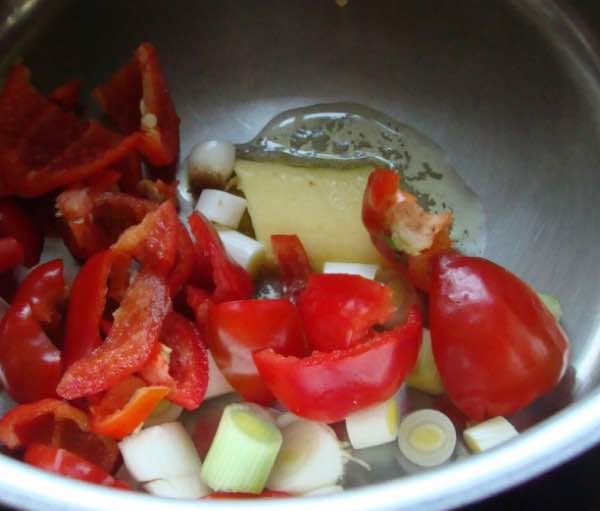
Wild leeks and growing peppadews are the start of our eight colors eggs Florentine; you do not get a more delicious and healthy breakfast. I like it quite soupy on toast made from our artisan bread; the wife likes it dry, but either way we both love it.
It is purely anecdotal but I am convinced that it is foods like this that enable us to enjoy a life without medication. Plenty of exercise too, which is the norm for every gardener, of course is important. It is at the heart of what makes the Blue Zones of the world so special; would you too not like to live well into your nineties with all your marbles intact and still have plenty of energy?
Do you really want to get off medication? Start enjoying coloured foods every day. Let your food be your medicine.
The beauty of eating right is that it not only tastes unbelievably good, but it is rich in anti-inflammatory phytochemicals, lignans that lessen the chance of getting breast tumours, lycopene that halves the likelihood of prostate disease, stronger bones and 10,000 other benefits, many of them quite unknown and unproven.
But the scientific evidence is there; those who enjoy eight or more coloured foods every day have a 33 percent lower all cause of death. That is massive.
Supporting your peppadews
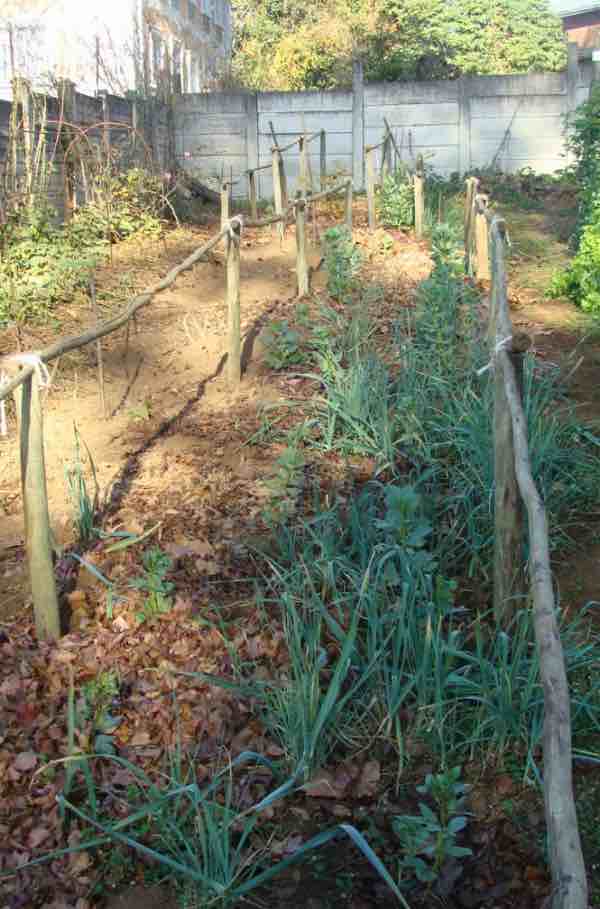
Supporting your peppadews, and other plants like the broad beans between the leeks that you can see is important; those that become top heavy with fruit. Crop rotation is vital. The legumes that grow in the winter provide the nitrogen for the summer veggies.
The good wife has scratched herself on wire ties, so I am being careful to bend the ends to safety.
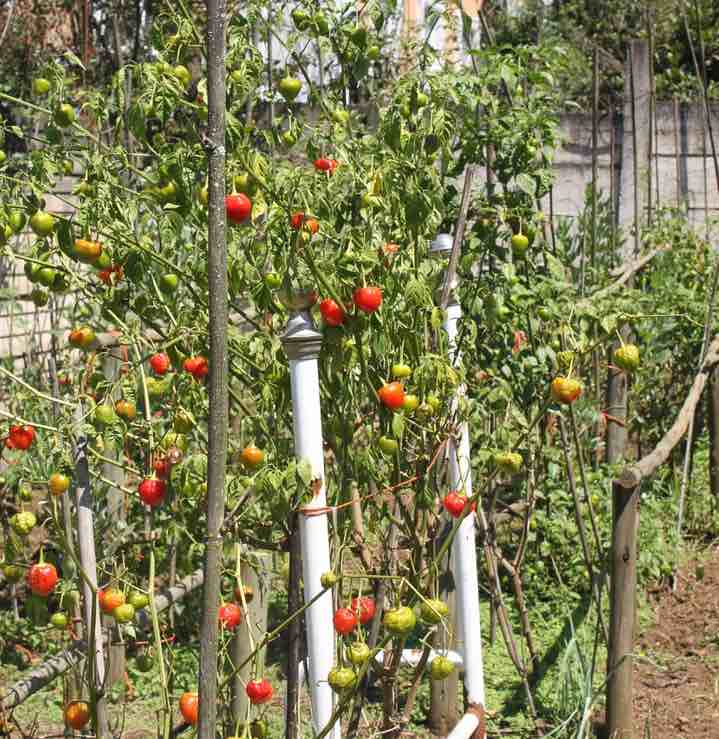
In the Spring when the beans come out, we will grow peppadews is this patch; and here they are in autumn of 2020. The wild leeks come up all over the garden. Despite some reports they do not seem to mind the legumes, nor are the latter affected by them.
These poles are not concreted in; they are very easy to move to a different location for crop rotation. They are made of treated timber, so they will not rot. As you can see I use a variety of different supporting structures for our peppadews.
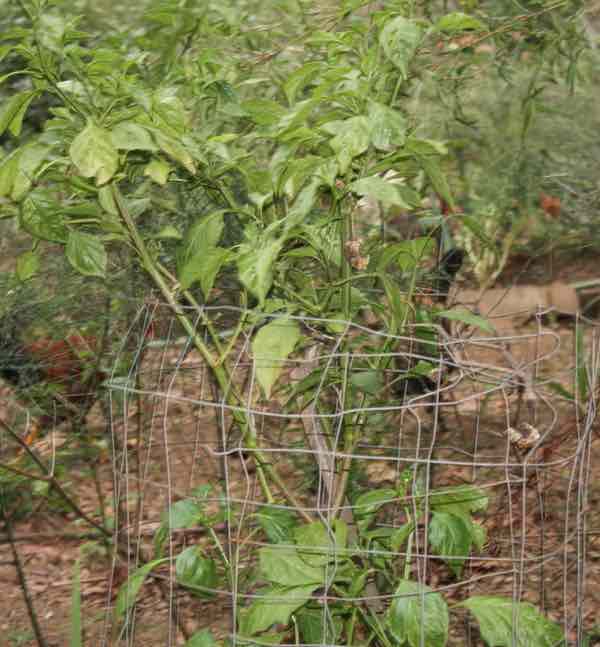
These peppadew cages also work very well. Everyone with chickens in
the garden will have some lengths of fencing over; can you see the two
camouflaged birds in the background? They are hiding from the raptors come for lunch quite often.
Pull or prune is always an issue in the garden; so many plants if cut back will send up new shoots in the Spring. It is now early summer and these will soon be in flower, but the new seedlings are still tiny; they have a very long growing season.
Macular degeneration
One of the reasons I am passionate about many coloured vegetables is the high content of lutein and zeaxanthin, the two carotenoids found in very high concentration in the macula of the eye where they give protection against high energy light.
Research shows that fruits and vegetables of various colours, like peppadews, have a relatively high content of these two phytochemicals that protect us from age-related macular degeneration.
Corn, kale and orange peppers top the list; egg yolks and spinach too. Fruits and vegetables that are sources of lutein and zeaxanthin is the subject of this link in the British Journal of Ophthalmology about the macular pigment in human eyes[1].
There is a mass of scientific material on the subject of these two special phytochemicals, far beyond a small site like this. But you can read some of it at lutein benefit and zeaxanthin macular degeneration.
Copy and paste "zeaxanthin macular degeneration" into the site search in menu bar above.
Freezing your peppadews
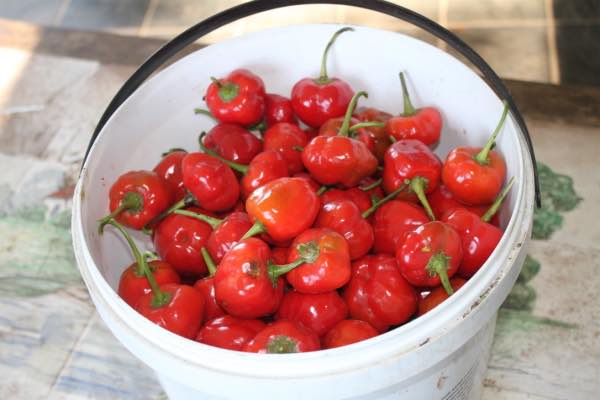
Growing them is a breeze; if you want them year-round for your cooking, then freezing your peppadews is a must; it is simple.
We are nearing the end of the season, and I still had more than fifty hanging on the bushes; so, yesterday, I picked them, cut them in half, and removed the stalk but leaving the placenta and seeds in place; that is where much of the capsaicin benefits are to be found. Drop them in a plastic bag and pop them in the freezer; every day one of them will go in our eight-colors eggs Florentine to give it a bit of spice.
Peppadews also make an excellent green chili sauce recipe; and because they are not so hot, you need not wait until they are bright red.
Commercial sauces in general are highly suspect. Read more at this link if you are willing to give the bottle a good shake yourself before use.
Peppadew recipes
In short there are dozens of peppadew recipes; there are so many ways to enjoy their enormous health benefits.
Stuffed peppadews are a great favourite, often with just plain old feta cheese.
Dried aleppo pepper
They are not unlike the Aleppo pepper in that they are sweeter and a lot less hot than many other chilies. We are going to start this season experimenting with drying them and having the flakes available throughout the year.
Incidentally do not also grow hot chillies in your garden if you have peppadews; the bees will cross-pollinate them and gradually they become hotter. We have learned this the hard way and having to pull out the plants producing fruit that makes your eyes pop out.
If you are growing peppadews, share your experiences with us and this lady will show you how she makes Aleppo pepper flakes.
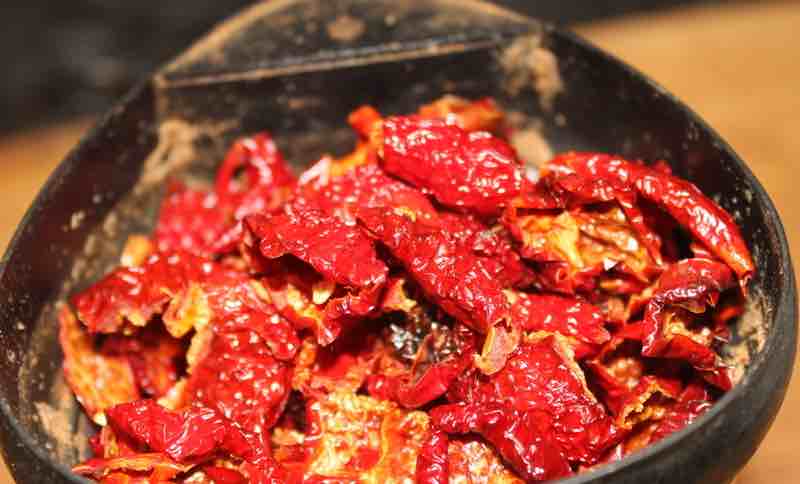
We have started experimenting with our own Hilton peppadew flakes during the extra time created by Covid-19. My initial thought is that it takes a lot of electricity, and expensive thus unless you have a solar generator. We are still in the phase of testing and ultimately will do a blog on the subject for those interested in having their own fresh chili powder.
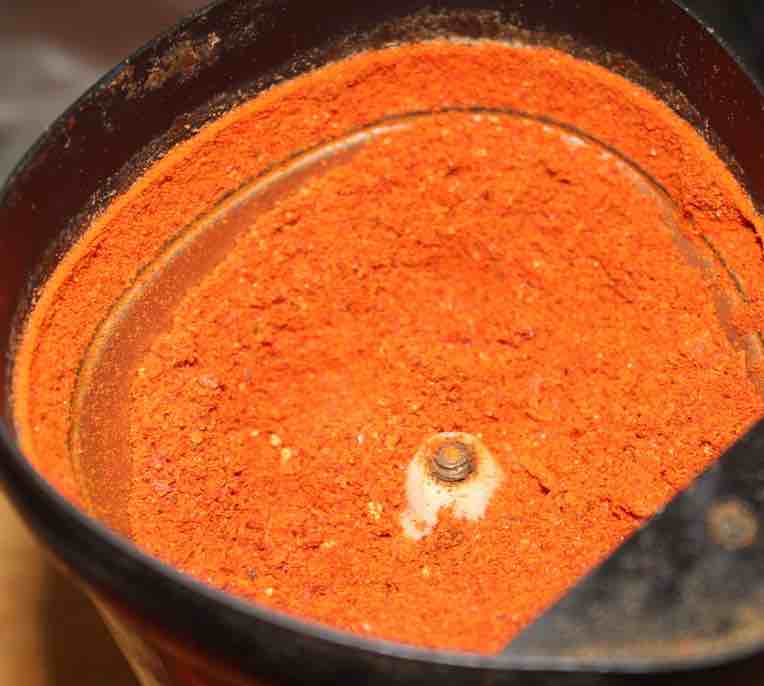
This is not particularly hot and we will experimenting with adding some of the seeds to create different levels of heat.
Fifteen peppadews will fill one spice jar.
This kale pesto made with peppadews is a great favourite.
Salsa de peppadew
A combination with tomatoes and herbs in this salsa de peppadew will enhance any stew; beef up your burger with it too.
Or just enjoy straight peppadew sauce; it is fermented to reduce the effect of antinutrients and adds a new dimension of flavour. It is an excellent probiotic.
Stuffed piquante peppadew recipes
Peppadews are such a versatile food. Try for example scooping out the seeds and filling them with a favourite mix; feta is one of ours. Add some finely chopped green onions to the cheese perhaps.
Can I make Dijon mustard? Absolutely you can, improving it perhaps after experimenting with growing peppadews; hard-line traditionalists would vehemently disagree of course but I never feel compelled not to experiment.
- Fruits and vegetables that are sources for lutein and zeaxanthin: the macular pigment in human eyes
- Food and inflammation
- Pathophysiology of atherosclerosis.
- How to preserve jalapeno peppers - exactly the same way; it is so easy.
When browsing use right click and "Open Link in New Tab" or you may get a bad gateway signal.
The material expressed on this page is gleaned from the nutritional and environmental literature; it is clearly referenced. A plain distinction is made between the author's opinion and that which is scientifically proven. When in doubt consult your health professional.
To suggest a correction or clarification, write to Dr Bernard Preston here. Contact.
Newsletter
Our newsletter is entitled "create a cyan zone" at your home, preserving both yourself and Mother Earth for future generations; and the family too, of course. We promise not to spam you with daily emails promoting various products. You may get an occasional nudge to buy one of my books.
Here are the back issues.
- Lifestyle and ideal body weight
- What are ultra-processed foods?
- Investing in long-term health
- Diseases from plastic exposure
- Intensive lifestyle management for obesity has limited value
- A world largely devoid of Parkinson's Disease
- The impact of friendly bacteria in the tum on the prevention of cancer
- There's a hole in the bucket
- Everyone is talking about weight loss drugs
- Pull the sweet tooth
- If you suffer from heartburn plant a susu
- Refined maize meal and stunting
- Should agriculture and industry get priority for water and electricity?
- Nature is calling
- Mill your own flour
- Bake your own sourdough bread
- Microplastics from our water
- Alternative types of water storage
- Wear your clothes out
- Comfort foods
- Create a bee-friendly environment
- Go to bed slightly hungry
- Keep bees
- Blue zone folk are religious
- Reduce plastic waste
- Family is important
- What can go in compost?
- Grow broad beans for longevity
- Harvest and store sunshine
- Blue zone exercise
- Harvest and store your rainwater
- Create a cyan zone at your home
Did you find this page interesting? How about forwarding it to a friendly book or food junkie? Better still, a social media tick would help.
Address:
56 Groenekloof Rd,
Hilton, KZN
South Africa
Website:
https://www.bernard-preston.com